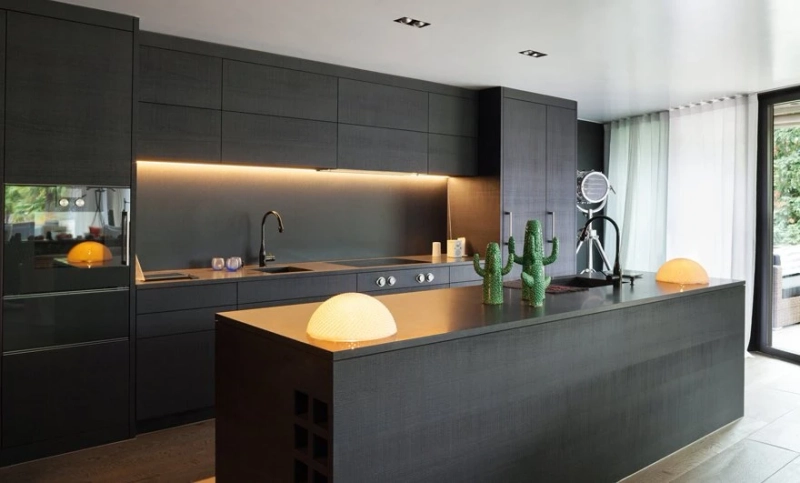In today's fast-paced world, the kitchen isn't just a place for preparing meals; it's the heart of the home. The demands of modern life have given rise to innovative solutions, and one of the most transformative trends in interior design is the modular kitchen. This design concept has revolutionized the way we use and perceive our cooking spaces, making them more functional, efficient, and aesthetically pleasing. In this article, we will explore the wonders of modular kitchen design, discussing its key features, benefits, and tips for creating the perfect modular kitchen for your home.
Modular Kitchen Design: A Brief Overview
Modular kitchen design is a systematic arrangement of various components, including cabinets, countertops, appliances, and storage units, to optimize space and enhance functionality. This design concept is characterized by its flexibility, allowing homeowners to customize their kitchen layout according to their specific needs and preferences. Here's why modular kitchens are the future of interior design:
1. Space Optimization: Modular kitchens are expertly designed to make the most of available space. They utilize every nook and cranny efficiently, ensuring that there's a place for everything and everything is in its place.
2. Customization: One of the most significant advantages of modular kitchens is the flexibility they offer. You can choose from a wide range of modules, finishes, and accessories to tailor your kitchen to your taste and requirements.
3. Enhanced Functionality: With built-in storage solutions, pull-out drawers, and cleverly designed cabinets, modular kitchens are designed to maximize functionality. This allows for seamless organization and easy access to your kitchen essentials.
4. Aesthetic Appeal: Modular kitchens are not just about functionality; they are also about style. These kitchens come in a variety of designs and finishes, from sleek and modern to classic and traditional, ensuring they complement your home's overall decor.
Key Components of a Modular Kitchen
To better understand the magic behind a modular kitchen, let's break it down into its key components:
1. Cabinets and Drawers: The backbone of any modular kitchen, cabinets and drawers come in various designs and sizes, providing ample storage for cookware, utensils, and more.
2. Countertops: Countertops are the workstations in your kitchen. They can be made of materials like granite, quartz, or marble, offering durability and style.
3. Appliances: Modern modular kitchens are equipped with the latest kitchen appliances like built-in ovens, microwaves, dishwashers, and more, seamlessly integrated to save space and provide a streamlined look.
4. Accessories: Accessories like pull-out racks, corner carousels, and soft-closing drawers add convenience and organization to your kitchen.
5. Lighting: Proper lighting is essential in a modular kitchen. Task lighting, under-cabinet lighting, and pendant lights enhance functionality and create a warm ambiance.
The Benefits of a Modular Kitchen
Now that we've delved into what makes a modular kitchen, let's explore the numerous benefits it offers:
1. Efficient Space Utilization: Modular kitchens are known for their ability to make the best use of space, ensuring that even small kitchens are incredibly functional.
2. Customization: You have the freedom to choose the components that suit your needs, ensuring your kitchen is tailored to your lifestyle.
3. Time-Saving: With everything well-organized and within easy reach, you can save valuable time during meal preparation.
4. Easy Maintenance: Modular kitchens are designed to be low-maintenance, with surfaces and materials that are easy to clean and durable.
5. Aesthetically Pleasing: These kitchens offer a contemporary and elegant appearance, making them a beautiful addition to any home.
Tips for Designing Your Modular Kitchen
If you're considering transforming your kitchen into a modular masterpiece, here are some tips to get you started:
1. Assess Your Needs: Identify your cooking habits and lifestyle to determine the essential features your modular kitchen should have.
2. Choose the Right Layout: Decide on a layout that suits your space, whether it's an L-shaped, U-shaped, or island kitchen.
3. Select Quality Materials: Invest in high-quality materials that will withstand daily wear and tear and still look great over time.
4. Consider Your Budget: Set a realistic budget and stick to it while exploring different options and finishes.
5. Pay Attention to Lighting: Lighting can make or break your kitchen. Plan for a well-lit space with the right fixtures to suit your needs.
6. Seek Professional Guidance: If you're not sure where to start, consider consulting a professional kitchen designer who can help bring your vision to life.



